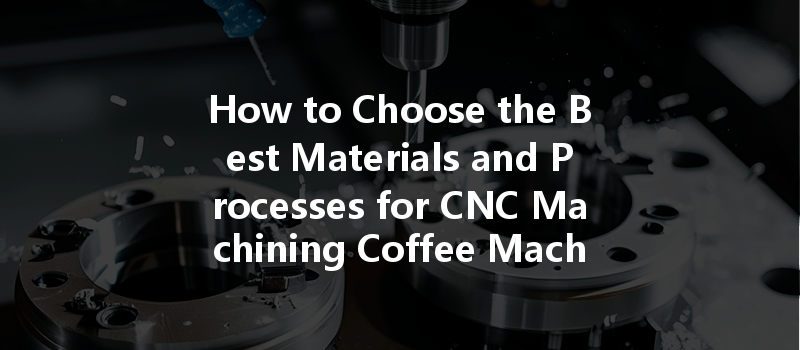Welcome to our deep dive into the world of CNC machining for coffee machine accessories, brought to you by YL Machining. In the aroma-filled world of coffee, it’s not just the beans and the brewing techniques that matter; the machinery that brings it all to life plays a pivotal role in every cup of joy. CNC (Computer Numerical Control) machining has reshaped manufacturing processes by marrying precision with efficiency. This article will explore how to choose the best materials and processes for CNC machining coffee machine accessories, ensuring that every piece is crafted to perfection.
Understanding CNC Machining
CNC machining refers to the automation of machine tools controlled by computers executing pre-programmed sequences of machine control commands. This technique allows for exceptional precision, accuracy, and consistency in manufacturing processes. For coffee machine accessories, which often require intricate designs and exact specifications, CNC machining has emerged as the go-to solution.
The Benefits of CNC Machining in Coffee Equipment Production
Choosing the Right Materials for Coffee Machine Accessories
Selecting the appropriate materials is crucial in ensuring the longevity and functionality of coffee machine components. Here’s a breakdown of the most commonly used materials and factors to consider when making your selection.
Overview: Stainless steel is prized in the food and beverage industry for its corrosion resistance, strength, and ease of cleaning.
Common Grades:
Why Choose Stainless Steel?:
Overview: Aluminum is lightweight, corrosion-resistant, and has good machinability.
Common Alloys:
Why Choose Aluminum?:
Overview: Brass provides excellent machinability and corrosion resistance.
Common Applications: Often used in fittings, valves, and connectors due to its low friction properties.
Why Choose Brass?:
Overview: Advancements in materials science have led to the development of composite materials (like carbon fiber and glass fiber) that can offer exceptional strength and lightness.
Why Choose Composites?:

CNC Machining Processes for Coffee Machine Accessories
Now that we’ve covered material selection, let’s explore the CNC machining processes that can be utilized in the production of coffee machine accessories.
Process Overview: CNC milling involves the use of rotary cutters to remove material from a workpiece. It’s suitable for shaping complex parts.
Advantages:
Process Overview: In CNC turning, a rotating workpiece is fed into a stationary cutting tool, allowing for the creation of cylindrical parts.
Advantages:
Process Overview: This machining method uses electrical discharges to cut hard materials. It is particularly useful for intricate designs and hard-to-machine materials.
Advantages:
Process Overview: A variant of CNC milling, routers are ideal for processing softer materials like plastics and composites.
Advantages:
Designing for CNC Machining
When it comes to designing coffee machine accessories for CNC machining, several principles should be followed to optimize the design for manufacturability.
Understanding and specifying the right tolerances is crucial. Tighter tolerances often lead to several production challenges, including increased costs. For coffee machines, where parts must fit and function correctly, standard tolerances should be established based on material and application needs.
Introducing draft angles (slight angles on vertical surfaces) helps in the removal process, enabling easier part release from tooling and molds while preserving accuracy.
Rounding off sharp corners not only helps in easing the manufacturing process but also enhances the durability of components by preventing stress concentrations.
Designing components that are easy to assemble reduces the time and labor costs associated with production. This consideration includes parts designed for easy alignment and attachment.
: Bringing It All Together at YL Machining
Choosing the right materials and processes for CNC machining coffee machine accessories is a multifaceted decision that requires careful consideration of both the functional requirements and aesthetic aspirations. By assessing the specific needs of your application and aligning them with the unique properties of different materials and machining processes, you can elevate your coffee machine accessories from functional components to finely crafted pieces of engineering.
At YL Machining, we pride ourselves on our commitment to quality, precision, and customer satisfaction. Our expertise in CNC machining ensures that each accessory we produce meets the highest industry standards while fulfilling the creative visions of our clients. Whether you are designing a sleek espresso machine or a robust coffee brewing unit, our team is here to guide you through every step of the process.
Thank you for joining us on this journey into the intricate world of CNC machining. May your coffee always be rich, your accessories always be precise, and your machining needs always be fulfilled.






